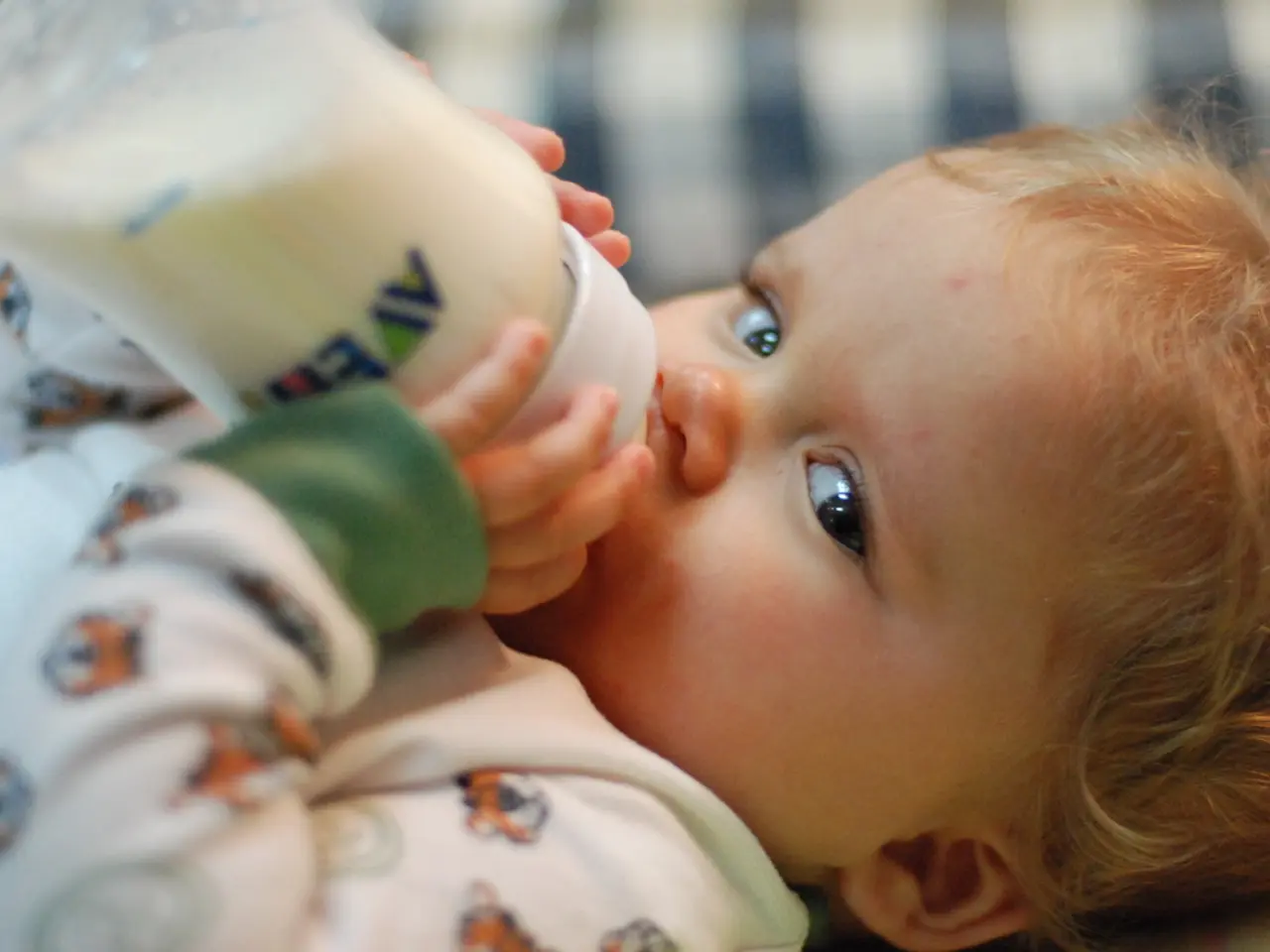Symptoms Not to Overlook: Indications That Your Child Might Suffer from Lactose Intolerance
Lactose intolerance is a common digestive issue that affects many children, particularly those who have a decline in lactase activity beyond childhood. This condition makes it difficult for the body to digest and absorb lactose, a sugar found in milk and dairy products.
When lactose-containing foods are consumed, children with lactose intolerance may experience a range of symptoms, typically appearing 30 minutes to 2 hours after consumption. These symptoms include diarrhea, often loose and sometimes frothy; abdominal pain and bloating; excessive gas (flatulence); nausea; irritability or fussiness; restless sleep; and in infants, nappy rash. In some cases, vomiting or a sensation of fullness may also occur [1][3][5].
It is essential to distinguish lactose intolerance from cow's milk protein allergy, which involves immune reactions like hives, swelling, or respiratory symptoms. Lactose intolerance symptoms are primarily gastrointestinal and tend to be milder [1][2][4].
Lactose intolerance does not involve the immune system and is not related to milk allergy. This misconception is common among parents, who sometimes confuse the two conditions [6].
In some cases, conditions such as Crohn's disease, an inflammatory disorder of the bowel, and celiac disease, a digestive disorder, can be associated with lactose intolerance. Additionally, infections like rotavirus or giardiasis can cause temporary lactose intolerance [3].
For children with lactose intolerance, it is crucial to ensure they still receive adequate amounts of calcium and vitamin D, as dairy is a good source for these nutrients. Over-the-counter lactase enzyme supplements can help alleviate symptoms when consuming lactose-containing foods [7].
A dietitian can help identify foods containing lactose for patients with significant symptoms. In young children and those who cannot perform the breath test, a strict elimination of lactose-containing food for two to four weeks can be an option for diagnosis. The lactose breath test is used to diagnose lactose intolerance, measuring hydrogen levels in the breath after consuming lactose [3].
Parents are advised to consult resources such as The Practical Guide to Lactose Intolerance for a comprehensive understanding of the condition. It is important to remember that lactose intolerance is a manageable condition, and symptoms can be avoided by limiting certain foods in a child's diet [8].
Cleveland Clinic, a non-profit academic medical center, recommends seeking professional advice for the proper diagnosis and management of lactose intolerance in children.
[1] https://www.ncbi.nlm.nih.gov/pmc/articles/PMC4760019/ [2] https://www.ncbi.nlm.nih.gov/pmc/articles/PMC3836572/ [3] https://www.ncbi.nlm.nih.gov/books/NBK470322/ [4] https://www.ncbi.nlm.nih.gov/pmc/articles/PMC3536576/ [5] https://www.ncbi.nlm.nih.gov/pmc/articles/PMC6091696/ [6] https://www.ncbi.nlm.nih.gov/pmc/articles/PMC5479541/ [7] https://www.ncbi.nlm.nih.gov/pmc/articles/PMC6287586/ [8] https://my.clevelandclinic.org/health/articles/12192-lactose-intolerance-in-children
- For proper management of lactose intolerance symptoms in children, it is recommended to consult resources such as 'The Practical Guide to Lactose Intolerance' for a comprehensive understanding.
- While some associate lactose intolerance with mental health issues, it is important to note that this condition primarily affects the gastrointestinal system.
- It is vital to ensure that children with lactose intolerance still receive necessary nutrition, such as calcium and vitamin D, through alternative sources beyond dairy products.
- Despite the common misconception, lactose intolerance is not related to skin care or CBD products; rather, it is a digestive issue that occurs due to a decrease in lactase activity.
- Nutrition and health-and-wellness experts agree that fitness-and-exercise, combined with a balanced diet, play a crucial role in maintaining good mental health alongside managing physical conditions like lactose intolerance.




